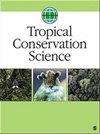缺乏可靠证据限制了对水电对亚马逊野生动物影响的理解:系统综述的结果
IF 1.6
4区 环境科学与生态学
Q2 BIODIVERSITY CONSERVATION
引用次数: 7
摘要
背景和研究目标:尽管水力发电为整个亚马逊地区的经济发展提供了能源,但在高度生物多样性的亚马逊环境中,如何最大限度地减少或减轻影响的战略仍不明确。越来越多的运行和计划中的水力发电需要强有力的科学证据来评估这些项目对亚马逊脊椎动物的影响。在这里,我们调查了现有的科学知识库,记录了水电开发对巴西亚马逊地区脊椎动物的影响。方法:我们回顾了1945年至2020年以英语、西班牙语和葡萄牙语发表的科学文献,以评估出版物中的时间和空间模式、采用的研究设计类型以及提供的科学证据。结果:共有25篇已发表的文章记录了对鱼类(n=20)、哺乳动物(n=3)和爬行动物(n=2)的影响。大多数研究设计(88%)缺乏适当的对照,只有三项研究采用了更稳健的前后对照影响设计。已发表的证据通常不支持因果推断,只有两项研究(8%)包括适当的对照和/或混杂变量。结论:几十年来发表的评估(其中60%由水电开发商或其子公司资助)似乎没有建立水电大坝对亚马逊脊椎动物影响的有力证据。缺乏强有力的证据可能会限制为保护巴西亚马逊地区受水电大坝影响的不同脊椎动物群体而制定有效的最小化和缓解行动。对保护的影响:为了避免误导性推断,有必要将更稳健的研究设计纳入巴西亚马逊水电开发的影响评估中。本文章由计算机程序翻译,如有差异,请以英文原文为准。
Understanding Hydropower Impacts on Amazonian Wildlife is Limited by a Lack of Robust Evidence: Results From a Systematic Review
Background and Research Aims: Although hydropower provides energy to fuel economic development across Amazonia, strategies to minimize or mitigate impacts in highly biodiverse Amazonian environments remain unclear. The growing number of operational and planned hydroelectrics requires robust scientific evidence to evaluate impacts of these projects on Amazonian vertebrates. Here, we investigated the existing scientific knowledge base documenting impacts of hydropower developments on vertebrates across Brazilian Amazonia. Methods: We reviewed the scientific literature from 1945 to 2020 published in English, Spanish, and Portuguese to assess the temporal and spatial patterns in publications and the types of study design adopted as well as scientific evidence presented. Results: A total of 25 published articles documented impacts on fish (n = 20), mammals (n = 3), and reptiles (n = 2). Most study designs (88%) lacked appropriate controls, and only three studies adopted more robust Before-After-Control-Impact designs. The published evidence did not generally support causal inference with only two studies (8%) including appropriate controls and/or confounding variables. Conclusion: Decades of published assessments (60% of which were funded by hydropower developers or their subsidiaries) do not appear to have established robust evidence of impacts of hydropower dams on Amazonian vertebrates. This lack of robust evidence could limit the development of effective minimization and mitigation actions for the conservation of diverse vertebrate groups impacted by hydropower dams across Brazilian Amazonia. Implications for Conservation: To avoid misleading inferences, there is a need to integrate more robust study designs into impact assessments of hydropower developments in the Brazilian Amazon.
求助全文
通过发布文献求助,成功后即可免费获取论文全文。
去求助
来源期刊

Tropical Conservation Science
BIODIVERSITY CONSERVATION-
CiteScore
3.60
自引率
5.90%
发文量
16
审稿时长
>12 weeks
期刊介绍:
Tropical Conservation Science is a peer-reviewed, open access journal that publishes original research papers and state-of-the-art reviews of broad interest to the field of conservation of tropical forests and of other tropical ecosystems.
 求助内容:
求助内容: 应助结果提醒方式:
应助结果提醒方式:


